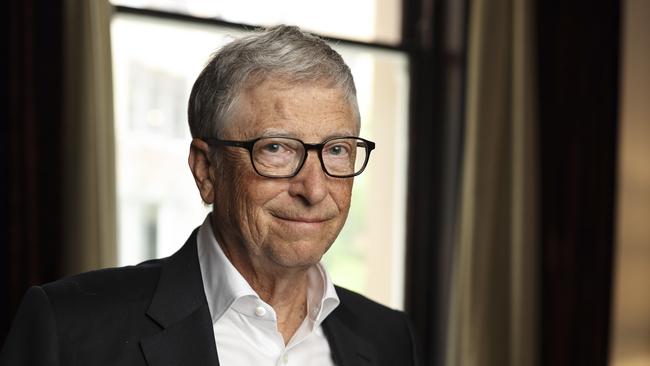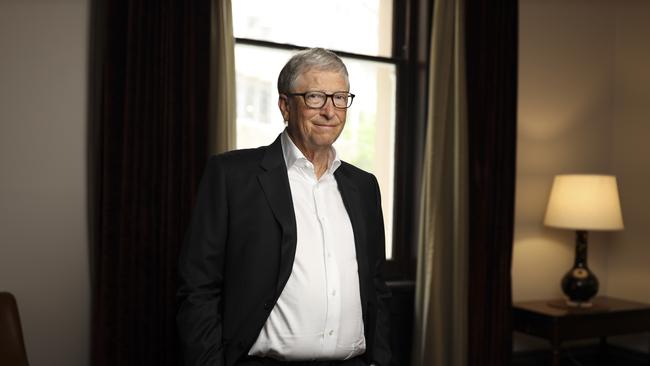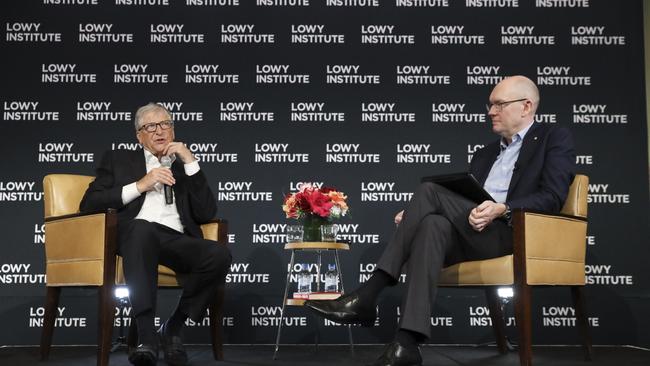Bill Gates backs gas in shift to green-energy world
The Microsoft founder is in Australia for a series of talks with Anthony Albanese about how the country can use gas to transition to clean power.

Billionaire philanthropist and Microsoft founder Bill Gates has backed gas as a critical part of the globe’s transition to green energy, saying it is the stepping stone to a hydrogen-powered world and that poorer countries will need fossil fuels like it for years to come.
The world’s fourth richest man is in Australia for a series of talks and met Anthony Albanese over the weekend.
He says it is still possible for the world to avoid the worst of global warming and that both gas and nuclear energy have a role to play.
In a wide-ranging interview with The Australian on Monday, that also covered pandemics, tech skills and education, Mr Gates said he supported ongoing use of gas both for the developing world as a basic necessity and to create new energy from hydrogen.
“(Gas) is unavoidably a transition fuel,” he said after an appearance at The Lowy Institute in Sydney. “What can you do? It is there. It is not going to be banned. The ideal is that we can convert it into hydrogen at low cost.
“Poor countries should not be blocked from either using domestic or imported hydrocarbons until the rich world first and then the middle-income countries second make the substitute technologies as inexpensive.”

His comments sit in sharp contrast to green groups calling for a total ban on gas extraction in Australia, refusing to recognise any role of gas in the energy transition. The government is under pressure to reduce both coal and gas in the energy mix to meet its target of a 43 per cent reduction in emissions from 2005 levels by 2030. It has recently excluded both fossil fuels from offering firm power within its new capacity mechanism.
Mr Gates is a major investor in technologies to tackle climate change and end global energy inequality. He has been a key backer of America’s recent climate legislation, the Inflation Reduction Act. The Bill & Melinda Gates Foundation, which has made grants of more than $US65bn to fight disease and poverty in developing countries, and Mr Gates’s Breakthrough Energy Fund of $US2bn invests in technologies from renewables to carbon capture and nuclear fission. “Two ways to make hydrogen, one is water, the other is natural gas,” Mr Gates said.
“We have a company C-Zero in the Breakthrough Energy portfolio that is a natural gas to hydrogen, and we have a bunch of companies that are water-to-green hydrogen. And in a country like Australia or the US where natural gas is very cheap you have to hope that part of the solution is that it is competitive to make green hydrogen.”
Mr Gates said there was now no chance that the world could limit global warming to 1.5C above pre-industrial levels. This would hit poorer countries harder. “It is very unlikely you’ll hit (a rise of) two degrees,” he said. “The key is to minimise the warming as much as possible and at this point to stay below 2.5 degrees would be pretty fantastic. I do think that is possible.”

Mr Gates did not urge Australia to develop a nuclear-power industry, despite being a strong believer in nuclear power as part of the new energy mix.
“If Australia wanted to be involved, that would be fantastic. But some countries, the politics are just so hard,” he said.
“You should not even try until you have something that is cheap and safe and you have clear waste story. The UK is very engaged in this, the US, France, China is very engaged. We have a critical mass of countries that want to fission work.”
TerraPower, an advanced nuclear fission company in which Mr Gates has invested, is designing a new sodium-cooled nuclear reactor fuelled by uranium in Wyoming. “We have a from-scratch design that is on paper a third of the cost. I’ve put billions of dollars into it so I must think there is some chance of succeeding,” he said.







To join the conversation, please log in. Don't have an account? Register
Join the conversation, you are commenting as Logout